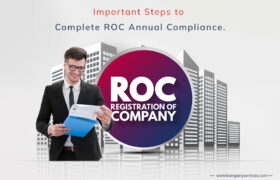One Person Company registration is a relatively new concept in India, and its purpose is to encourage the formation of commercial firms that are owned and operated by a single individual. It takes at least two people to form a partnership in order to form some types of corporations, such as a limited liability partnership, a private limited company, or a limited company. One Person Companies, on the other hand, enable a solitary person to have ownership of and responsibility for running the company. Those who are interested in beginning an unregistered proprietorship can consider forming a One Person Company as a potential alternative. In this blog, we will contrast the beginning and management of a One Person Company in India with those of a Private Limited Company.
Fees Associated With Signing Up
The fees associated with registering a One Person Company are significantly lower than those associated with registering a Private Limited Company.
Minimum Number of Shareholders Needed to Incorporate
Two people are required in order to legally constitute a “One Person Company.” The director of the one-person company and the nominee director of the company. In the event that the Director is unable to carry out his duties, it is the responsibility of the Nominee Director to oversee the operation of the Company. It takes a minimum of two people to successfully incorporate a Private Limited Company.
Executive Committee of Directors
Due to the fact that a single individual is capable of running the operations of a One Person Company, there is no such thing as a board of directors in such an organisation. The ideas of holding an annual general meeting and board meetings are likewise inappropriate for a company that consists of just one person. A board of directors for a limited liability company can have anything from two to seven members, with the lowest number being two and the maximum being seven.
Holdings of Shares
One person is able to hold all of the shares in a One Person Company (also known as an SPC). A private limited business needs to have at least two shareholders in order to function. As a consequence of this, it is impossible for a single person to have all of the shares in a private limited business.
Nationals of a Foreign Country or NRIs
To establish a One Person Company, one must meet both the citizenship and nationality requirements of India. NRIs and foreign nationals both have the ability to create and operate their own private limited companies. There are a variety of industries that welcome 100 percent foreign direct investment from private limited companies.
Essential Conditions for Compliance
There is not much of a difference between the compliance standards for a One Person Company and those of a Private Limited company. Both One Person Companies and Private Limited Companies are obligated to submit their yearly returns to the Ministry of Corporate Affairs as well as their income tax returns to the Income Tax Department. This obligation applies to both types of businesses. In addition, each year, One Person Companies and Private Limited Companies are required to have an audit conducted on their financial records.
Restrictions or Boundaries
If the annual sales turnover of a One Person Company is greater than Rs. 2.00 crores or if the paid-up capital of the One Person Company is greater than Rs. 50 lakhs, the One Person Company is required by law to be changed into a Private Limited Company. There is no obligation for mandatory conversion under any circumstances, and a private limited corporation is exempt from such restrictions and constraints.
After the Company Was Founded
One Person Company is a new business structure that was recently implemented in India. There are still some government departments and banks that have not upgraded their computer systems, documents, or procedures in order to deal with one-person businesses. After the creation of a one-person company, you can have trouble getting some licences or registering your business because of this.
The Private Limited Company has been around for several decades and is currently the most common form of business structure in India. As a result, the procedure of getting various licences and registrations after the establishment of a private limited company would be straightforward and uncomplicated.
Conclusion
The nature of a One Person Company and a Limited Liability Company (LLC) is extremely similar on many fronts, including the cost of incorporation, the number of people required to incorporate, and compliance requirements. One Person business, on the other hand, has a great deal of additional restrictions on foreign promoter participation, required conversion to private limited business, and so on. Therefore, in order for the notion of a one-person company to gain traction in India, we at Kompany Services advise that entrepreneurs create a private limited company rather than a one-person company.




